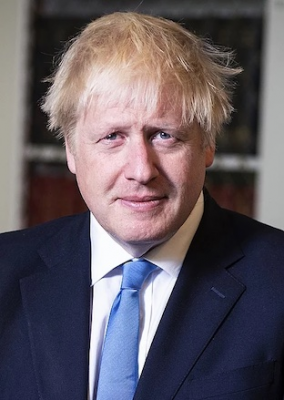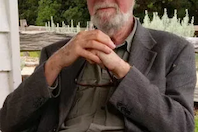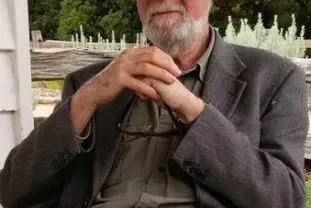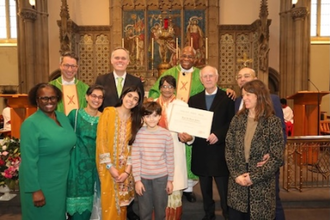Ian Linden: Boris Johnson - The trouble with apologies

Boris Johnson Official Portrait 2019 Open Government Licence v3.0
"Sorry seems to be the hardest word'. The public could sing along with Elton John during the rolling Partygate scandal right until the Prime Minister's statement to the House of Commons about Sue Gray's cut-back Report. Last Monday, Johnson finally, said it: "I want to say sorry and I'm sorry for the things we simply didn't get right and the way this has been handled. It isn't enough to say sorry ... " and so on.
As Nick Robinson pointed out on the next day's Today programme, after this solemn introduction an apologetic "I" became a collective "we". Or is the Prime Minister now using the royal "we"? He was probably trying to diffuse responsibility. The public have to wait for the Met's Day of Judgement and the full Report to find out, or not, who the "we" are. Meanwhile, "….we must look at ourselves in the mirror and we must learn", Johnson told the Commons. I am not sure exactly what Mr Johnson wants them to learn, what all those civil servants and young Special Advisers, the No 10 spads, are going to see in the mirror, other than someone with an imminent career change.
What does Johnson expect to find when he himself looks in the mirror? He had baptismal water poured on him as a baby and married in a Catholic Church. Who knows, he might see a Catholic. Or at least he might wonder if Catholicism could give any guidance on escaping his troubles.
When it comes to apologies, the Church has significant things to say and some useful guidance to give. For example, that an apology to be meaningful requires what used to be called "a firm purpose of amendment", in other words stopping doing damage and remedying the damage done. Or as bishop and theologian St Augustine put it (writing in the 5th century in Latin): "The confession of evil works is the first beginning of good works. You do the truth and come to the light". Not easy advice to follow most Christians would agree, there are all too many reasons for not reforming. It would require the Prime Minister to take full personal, individual - as well as institutional or organisational - responsibility for the dire straits his government now finds itself in as well as for specifically Partygate. It would require his grasping the moral values that should inform and inspire politics encapsulated in the Nolan principles. This would require a heroic degree of personal transformation.
Perhaps because it has become increasingly difficult to put the future right, with its pandemics, Climate change, inequality and poverty, we have recently been getting apologies from all sorts of people about all sorts of past wrongs, almost as if they are trying to put the past right. Most of these apologies come across as honest, heartfelt and valuable. A small number of them form part of a negotiation of self-interest.
Johnson's Commons statement will have gone through several drafts. The opening with its switch from "I" to "we" deserves attentive parsing after all the hard work that went into it. It purports to be an apology bringing closure, time to move on. Though, as reported in the Daily Mail, telling MPs outside the Chamber "they (the Met) won't find fault with what I've done" immediately puts its sincerity into question. What made Tory apologies for Partygate particularly striking is that they came in the wake of the public, and a significant number of MPs not all on the other side of the House, asserting traditional moral values, fairness, integrity, truthfulness, and solidarity. That is why Boris Johnson, a promoter and shaper of that political culture from which they have fast disappeared, doesn't "get it" and so won't be able to "fix it".
When interrogated by Nick Robinson, Dominic Raab, Deputy Prime Minister, Justice Secretary, and Lord Chancellor, taking his place in the demeaning procession of Cabinet Ministers defending the Prime Minister, used the word 'contrition' to describe Johnson's apology. Looking at the public record, it is hard to imagine contrition being part of Boris Johnson's repertoire of feelings or an accurate description of the motivation for his Commons statement.
Contrition still retains much of its Christian meaning: feeling remorse, regret, repentance and penitence. Catholics - and Johnson at least nominally is one - have the prayer of contrition at the end of Confession, an apology to God would be one description, knowing that they are only absolved from their sins if the contrition is sincere. The prayer has three main elements: recognition of the wrong done and the failure to do good, sorrow and regret for both, plus commitment to actions of self-denial done out of repentance for the wrong committed. In Johnson's case the last would entail the restoration of a healthy political culture for which his resignation would be a first step.
So, apologies to Elton John but sorry is not the hardest word. Genuine contrition is harder - particularly for a personality such as Boris Johnson. The hiatus while the Met's investigation runs its course is an opportunity for the Prime Minister. He now has a clear choice: he can resign with dignity taking personal responsibility for his own failings as well as what he sees as his successes and this might alter how his political legacy is seen. Or he can brazen it out and suffer the humiliation of being forced from office.
The House of Commons is not a confessional but there is a message for the "we" with which Johnson peppered his Commons statement. Contrition for the damage done to this country, its people and its politics should now also motivate the "we" who are defending the indefensible and who believe lying, gas-lighting and misplaced loyalty are more important than truth, integrity and the Common Good. Rediscovering such a moral stance would be in their own self-interest and, long-term, in the interests of the Prime Minister but, above all, in the interests of the country.
Professor Ian Linden is Visiting Professor at St Mary's University, Strawberry Hill, London. A past director of the Catholic Institute for International Relations, he was awarded a CMG for his work for human rights in 2000. He has also been an adviser on Europe and Justice and Peace issues to the Department of International Affairs of the Catholic Bishops Conference of England and Wales. Ian chairs a new charity for After-school schooling in Beirut for Syrian refugees and Lebanese kids in danger of dropping out partnering with CARITAS Lebanon and work on board of Las Casas Institute in Oxford with Richard Finn OP. His latest book was Global Catholicism published by Hurst in 2009.
Visit his website here: www.ianlinden.com


















